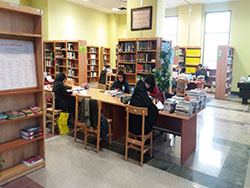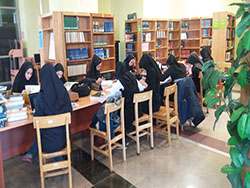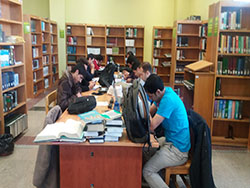|
The human’s life has advanced with “questions” since the beginning of creation and this issue is as old as the human himself. Hence, mankind has always had many questions in his mind. The initial questions were simple and on the other hand, human’s answer to these questions was based on the experienced humans’ memory. As the human made progress and knowledge was developed, mental memories weren’t able to answer plentiful and various questions in different topics of the science and also the mental knowledge was not recordable and therefore, it wasn’t transferable to the next generation.
Nowadays, the huge resources of human’s knowledge are recorded and recoverable in printed and electronic sets. We need a knowledge and service named the “reference service” and the “reference interview” to understand what question is answered in what science resource and how to understand the client’s question with the best method. The reference unit is a place for keeping these resources i.e. resources with generally alphabetic structure (like dictionaries, encyclopedias, thesaurus, etc) and also for providing reference services such as answering the reference questions. The central library and information center has dealt with gathering world reference sets and resources since foundation as when the reference unit of the library started to work in 1996, it had 1500 Persian and Latin books kept separately in two halls with 200 meters area. Before transferring the library to its new building in 2012, its stock was 7000 topics. After transferring the library to the new location and aggregating the libraries of the units in the central library, this library’s reference books were increased to 12000 topics. After weeding the old resources, it now (November 2014) has 12104 Persian and Latin books. Two rooms with the area of 740 square meters have been assigned to the reference unit in the new library which Persian and Latin resources are kept separately by two librarians in each of them. |



![]()
| Course Name | Time | Location |
|
|
Introducing different kinds of printed reference resources, how to search and recover information |
Tuesdays 12 p.m. to 2 p.m.
Thursday 10 a.m. to 12 p.m.
|
The Reference unit of the central library |
Activities
|
Some of this unit’s activities have been accounted briefly below:
|
|
colleagues |
|
In Charge of the Reference Unit M.A. in Information and Knowledge Science Telephone: 38806540 Email: |
Senior Expert of the Reference Unit M.A in Information and Knowledge Science Telephone: 38806553 Email: |
Related topics
- new added references
- brochures
- The unit’s instructions
- Conditions and regulations of using the unit
- Chat guide
- Visual guide to the reference unit
- Bibliographies
- Free reference resources
- Thesaurus and how to use it
- Body language and reference interview
- Citing handbooks
Some of this unit’s activities have been accounted briefly below:
· Responding to referential, reality-demander, subject and research-based questions
· Carrying out reference services via telephone, chat and E-mail
· Consulting and helping students in choosing research topic regarding the reference and non-reference resources
· Helping and accompanying clients in subject computer searching
· Teaching the users how to use the reference resources
· Preparation for holding “Research Method” classes at the reference unit and introducing resources
· Holding individual and group meetings for introducing reference services
· Training librarianship students and apprentices who have reference lessons.
· Vast activity in identifying reference resources and suggesting to buy them
· Preparing educational handbooks and all kinds of guidelines to guide clients in using the resources
· Introducing major and important resources in the form of article in library’s publications
· Helping researchers to find “References” to carry out the concerned research
· Preparing scan and copy of requested resources and sending them
· Providing consultation services and guiding in preparing resources to found information centers and libraries
· Guiding clients in research method and accomplishing it
· Weeding old and repetitive resources
Receiving suggestion of buying new resources required by clients in person or via telephone, chat, Email


